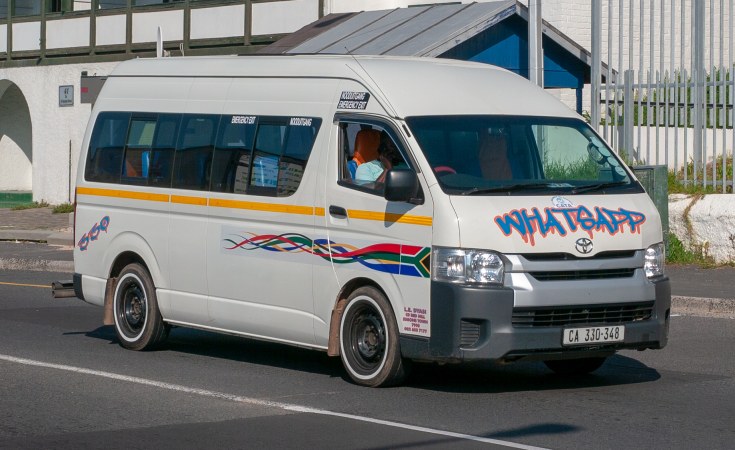Here are facts on how big the industry is, how much drivers make, and the taxi industry's role in crime
The public transport system has been brought to a halt for more than a week since the minibus taxi industry in the Western Cape went on strike.
Taxis are responsible for about 75% of public transport in the province and transport about one million passengers daily, according to the Western Cape Department of Mobility. They are also responsible for serving areas that are not often covered by other public transport.
There are probably about 1,200 taxi associations nationally but they fall under two main umbrella organisations: South African National Taxi Council (SANTACO) and National Taxi Alliance (NTA).
SANTACO is leading the strike.
SANTACO consists of over 123,000 individual taxi operators belonging to more than 950 minibus taxi associations nationally, according to court papers it recently submitted to the Cape High Court. It is much bigger than the NTA. In an interview on Cape Talk, an NTA spokesperson said the organisation stands in solidarity with SANTACO during the strike.
Taxis need an operating licence to provide a public transport service. These licences are regulated and approved by Provincial Regulatory Entities (PREs). SANTACO said in its recent court papers that in order to apply for this licence, a letter of recommendation from a taxi association was required. And to join an association can cost between R10,000 to R200,000. (We're not sure what differentiates the price across different associations.) In this way, a taxi operator must first be part of an association in order to access a route and an operating licence.
Precise data on how much the industry earns and spends is hard to come by. But this is what we could find:
The taxi industry generates at least R100 billion per year, according to a 2021 report by the Competition Commission. "These vehicles travel approximately 19 billion kilometres a year, and the most commonly used models are the Toyota Quantum Ses'fikile, followed by Nissan Impendulo. Most of these vehicles have a carting capacity of between 13 to 16 passengers," says the same report.
In September 2022, former Western Cape MEC for Transport and Public Works Bonginkosi Madikizela said that in the Western Cape, the minibus taxi industry makes about R1.5 million per day, compared to R240,000 for Golden Arrow Bus Services and R35,000 for the MyCiTi bus service.
According to Associate Professor Andrew Kerr of the UCT School of Economics, over the past few years there are likely between 15,000 and 20,000 taxi drivers in Cape Town. There are about 200,000 to 250,000 drivers nationally, so Cape Town is between 7% and 10% of the national total.
According to the Department of Transport discussion document from September 2020, of the 200,000 minibus taxis about 63,000 to 100,000 are operating illegally, i.e without an operating license.
The Western Cape taxi strike has also left thousands of taxi drivers without an income for over a week. Income differs depending on the day and the route. One taxi owner and driver who spoke to us anonymously told us that their usual target is between R800 and R1,000 daily. He drives the routes from Wynberg, Mitchells Plain, and Grassy Park. But he said that drivers who drive to the Cape Town CBD make better money with a target of about R1,000 and R1,200.
The driver pays his "gaatjie" (sliding door operator) between R150 and R250 depending on the day and petrol is R700 and R800 per day. On a bad day there is no take-home cash for the driver.
He bought his taxi secondhand for R120,000 and he can't afford insurance. He said that you make more money the days following payday, and less income from about the 5th of the month until the next payday.
Violence frequently flares between those affiliated with Cape Amalgamated Taxi Association (CATA) and the Congress of Democratic Taxi Associations (CODETA), two of the biggest taxi associations in the Western Cape. (Both belong to SANTACO.)
In its 2021/22 annual report, the Western Cape government said that violence in the minibus taxi industry was "at a record high" and bus services continued to be under regular attack.
The Western Cape government indicated that between 1 April 2021 and 31 March 2022, 110 taxi-related murders and 71 attempted murders were reported to the Department of Transport and Public Works. One of these murders included the president of CATA, Victor Wiwi.
A report from the Global Initiative Transnational Organised Crime estimated that nationally, half of all organised hits between 2015 and 2020 were related to the taxi industry.
Other forms of public transport, most recently Golden Arrow Buses, have long experienced resistance from the taxi industry. Since Thursday, 10 Golden Arrow buses have been torched.
The taxi industry has been accused of sabotaging Cape Town's other public transport, MyCiTi and Metrorail, for years. In 2017, following a taxi strike believed to be about an internal SANTACO conflict, several MyCiti and Golden Arrow buses were stoned and set alight.
In August 2018, MyCiTi suspended its services in Khayelitsha after three of their buses and two MyCiTi buses were attacked. Later that year, nine MyCiTi buses were petrol bombed, causing R22-million worth of damage. A MyCiTi station and two buses were torched in June 2020.
Golden Arrow reduced its services in 2021 after a driver was shot on the N2.
In 2022, a taxi driver convicted of setting Metrorail trains alight, admitted that he earns more when trains are not in use. Two trains at Cape Town station were set alight in 2019, causing R33-million of damage.
Between 2013 and 2019, 214 train carriages were torched nationwide. Cape Town's Metrorail infrastructure shrunk from 90 carriages in 2015 to just 44 in 2018. The vast majority of these train attacks were in the Western Cape.


